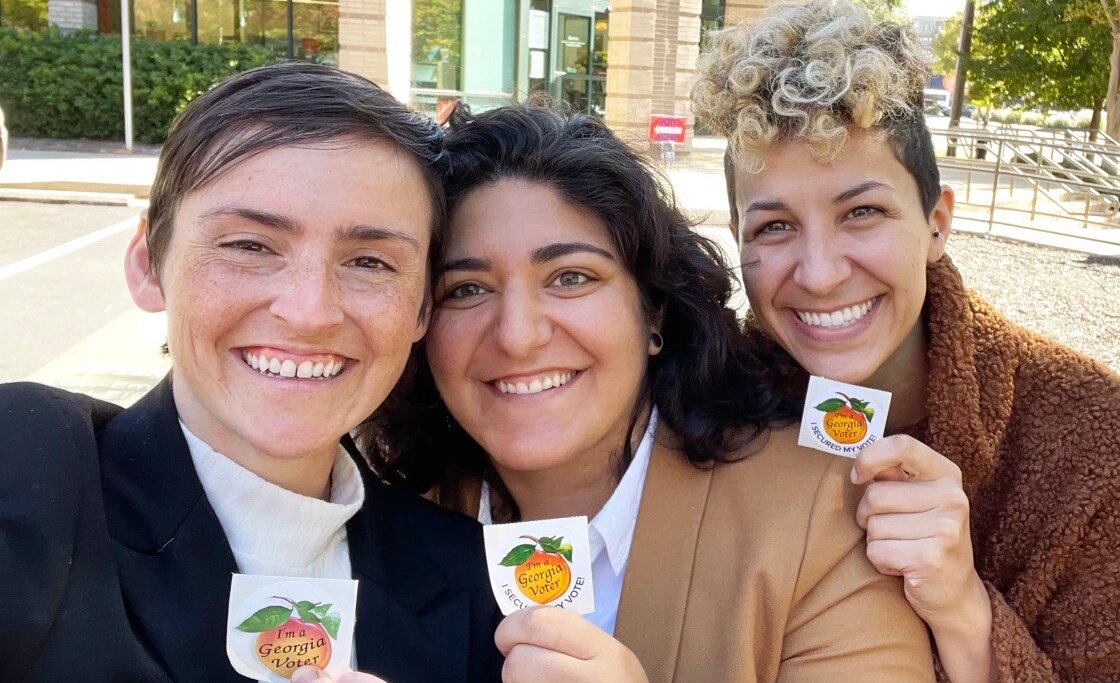Atlanta City Council member Liliana Bakhtiari had a few reasons for coming out as non-monogamous.
“We had been working toward coming out for a year,” Bakhtiari told Xtra over the phone on October 4, referencing their relationship with partners Kris Brown and Sarah Al-Khayyal. “We had talked about it early on and wanted to come out for several reasons. It felt like it had been enough time, building relationships with the constituency. It wasn’t fair for Sarah to live in the closet, and we really wanted to destigmatize it—that was one of the most important things.”
Bakhtiari, Brown and Al-Khayyal came out as non-monogamous last Wednesday in an interview with NBC News. Bakhtiari, the first non-binary council member of a major U.S. city and the first queer Muslim person elected to office in Georgia, met Brown in a gay bar in Atlanta in 2012. Eight years later, Bakhtiari became acquainted with Al-Khayyal through a non-monogamy support group, and soon the three began dating.
Although they came out publicly, Bakhtiari said their relationship “shouldn’t be news.” “On the internet, strangers … not the warmest of welcomes,” she said. “But in my political circle, they’ve all been warm. So many of my constituents have texted and called to say that they were proud to support me, and I couldn’t be more grateful.”
Bakhtiari, who won their city council seat a year ago, may be the first U.S. politician to be in a non-monogamous relationship, according to the Victory Institute, an LGBTQ2S+ political action group. The lack of political representation, however, doesn’t reflect a lack of non-monogamous relationships: a Chapman University study in 2014 found that at least five to five percent of Americans—around 16.5 million people—were currently involved in a consensual non-monogamous relationship.
Diana Adams, the co-founder of the Polyamory Legal Advocacy Coalition, applauded Bakhtiari’s coming out. “Visibility promotes acceptance and understanding,” she told Xtra. “Liliana Bakhtiari coming out as non-monogamous as an Atlanta city council member promotes acceptance of ethically non-monogamous people in our communities.”
“The majority of people in the United States are part of a diverse or modern family structure, and it’s important to see ourselves in our leaders,” added Heath Schechinger, a founding co-chair of the American Psychological Association’s Division 44 Committee on Consensual Non-Monogamy, in comments to Xtra.
Despite the gap in non-monogamous political representation, the community has won some recent legal victories. In September, a New York civil court argued that polyamorous relationships are entitled to the same legal protections as monogamous couples in a ruling that uniquely asserts that non-monogamous families’ right to housing protections.
The case involved a deceased man who had two romantic partners: a husband who lived at a different address and a partner who lived with him. The deceased man’s landlord argued that his unmarried partner had no right to renew his lease, since he was just a “roommate.”
In ruling against the landlord, the case represents one of a handful of victories that non-monogamous families have won in recent years. Utah reduced bigamy from a felony to a misdemeanour in 2020, and that same year, the Massachusetts towns of Somerville and Cambridge passed ordinances allowing groups of three or more people to be considered domestic partners.
But despite these recent wins, people in non-monogamous relationships often find that the norm of monogamy harms their lives, which Bakhtiari has also experienced.
“I was in the emergency room two weeks ago, and Sarah was out of town,” they said. “If that hadn’t been the case, I would have had to choose between Sarah and Kris, who would have been with me. The scope of the law doesn’t allow you to recognize more than one partner. It’s not even advocating for bigamy. It’s just advocating to be with more than one person because we’re all invested in each other’s well-being.”
Bakhtiari wasn’t the only person, either, who has experienced difficulties because of discrimination against non-monogamous couples. Since they came out, Bakhtiari has heard from others who have shared similar encounters, and these individuals deserve the same protections as everyone else.
“One gentleman messaged me that his son’s teacher tried to have his child taken away from him because he was non-monogamous,” they said. “I anticipate once we start a family there will be a lot of difficulties, just like there were for that child.”


 Why you can trust Xtra
Why you can trust Xtra


